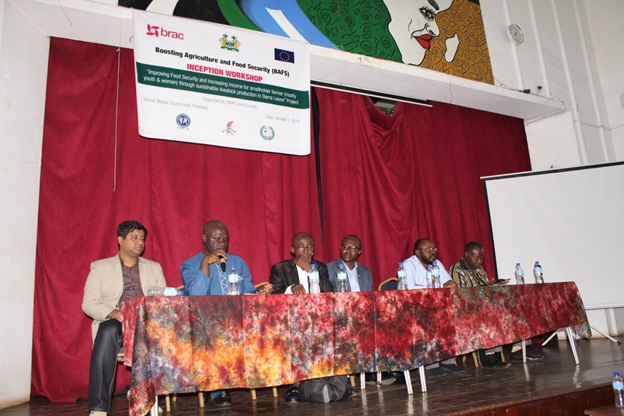BRAC Sierra Leone in collaboration with the Ministry of Agriculture and Forestry (MAF), has officially launched a 3-year project titled “Improving Food Security and Increasing Income for Smallholder Farmers (mostly youth & women) through Sustainable Livestock Production in Sierra Leone”.
The project is funded by the European Union (EU) – Boosting Agriculture and Forestry Programme.
The program which attracted representatives European Union (EU), Ministry of Agriculture and Forestry (MAFS), Sierra Leone Agricultural Research Institute (SLARI), Njala University and BRAC International.
was held on the 3rd October, 2019, at the British Council Auditorium in Freetown.
The strategic aim of the project is to improve food security and reduce poverty of 4,140 livestock farmers through diversification of the livestock sector and developing a better functioning livestock value chain.
The project will be implemented in partnership with three local Non-governmental Organizations; Partners in Integrated Community Empowerment Programs (PICEP-SL),Community Empowerment and Development Agency (CEDA-SL) and Kambia District Development and Rehabilitation Organization (KADDRO).
BRAC Sierra Leone is the lead consortium member of the project.
It will be implemented in 5 districts (Western Area Rural, Pujehun, Bonthe, Kailahun & Koinadugu districts) and will target a total of 61,363 beneficiaries. They will benefit (directly/indirectly) from diversified production and increased income.
The project will also focus on contributing towards enhancing the capacity of farmers to adopt improved livestock production techniques; ensure improved access to quality inputs that would increase availability of improved breed; enhance private sector interest and investment in livestock; ensure increased farmers’ access to extension services including veterinary to promote healthy environment for livestock to thrive; amongst many others
Acting Country Representative, BRAC Sierra Leone, Victor Kamara, emphasized that “collaboration is non-negotiable” in the implementation of the project. He reiterated the respective roles and responsibilities of the partners and the Ministry of Agriculture and Forestry, in ensuring a successful and impact driven implementation.


